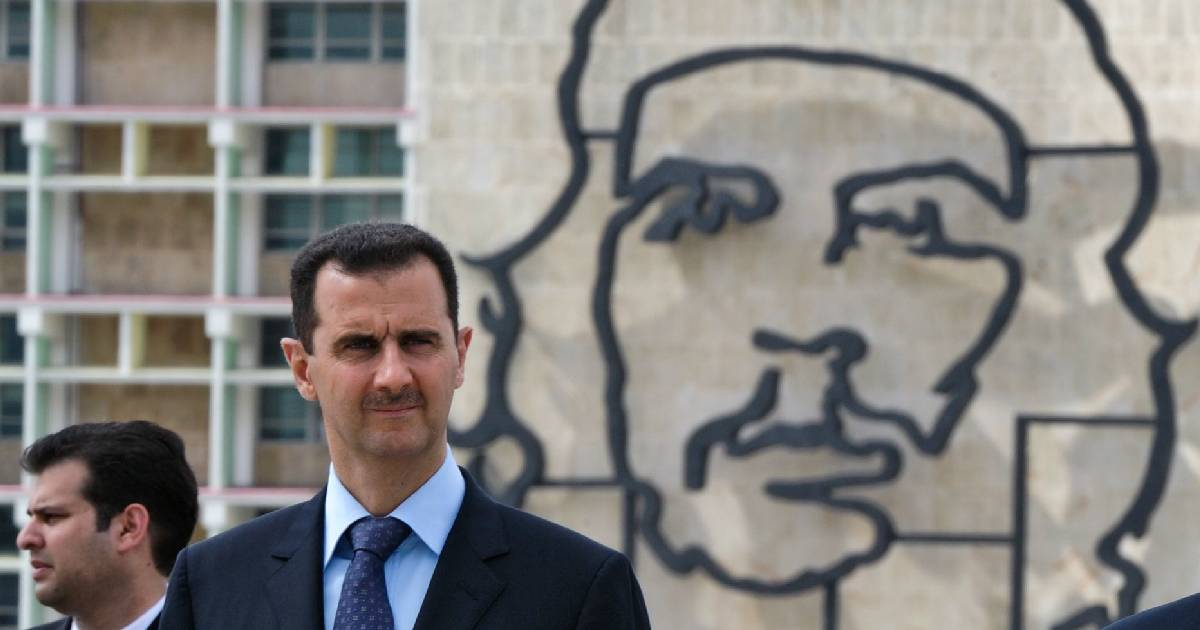
The government of Cuba has remained completely silent following the fall this Sunday of Bashar al-Assad, the Syrian president, whose family ruled for over 50 years, maintaining a dictatorship in the Arab nation.
While Miguel Díaz-Canel and Bruno Rodríguez Parrilla, the Cuban Minister of Foreign Affairs, focus their tweets on the relations between Cuba and the Caribbean Community (CARICOM), their silence regarding the situation in Syria has drawn the attention of analysts and Cuban opponents, given that Assad was a close ally of the Cuban regime.
Historically, Havana has been among the allies of the Syrian dictatorship. In 1973, Cuba sent a tank brigade to the war against Israel, in which the then Syrian dictator Hafez al-Assad, father of the ousted president Bashar al-Assad, participated.
At the time, dictator Fidel Castro described the relationship between the two countries as a "solid friendship" and asserted that "Syria consistently supports Havana's political positions."
In 2010, Bashar al-Assad made an official visit to Cuba, reaffirming "the deep and unbreakable bonds of friendship" between the two governments.
This relationship continued to be evident on the international stage, as demonstrated in March 2021, when Cuba voted against the resolution titled "Situation of Human Rights in the Arab Republic of Syria," which was discussed at the United Nations Human Rights Council.
The initiative, presented by several nations, strongly condemned the violations and abuses of human rights in Syria, as well as the crimes against humanity and war crimes attributed to the al-Assad regime.
This explains the peculiarities of the Cuban regime's silence, which just days before had declared its support for the Syrian dictatorship and Assad, at a time when the political climate in that nation was becoming increasingly tense.
On December 4th, the Cuban Minister of Foreign Affairs, Rodríguez Parrilla, stated that he had spoken by phone with Bassam Sabbagh, the Syrian Foreign Minister.
“I reiterated Cuba's support and solidarity with the Syrian people and government in the face of terrorist attacks against several cities in the country and the need to preserve the sovereignty and territorial integrity of that sister nation,” Rodríguez Parrilla indicated from his account on X.
Days later, amidst the ongoing digestion of this event, which marks an unexpected turn in the political landscape of the Middle East, the official Cuban media have restricted themselves to sharing the news of the overthrow, without providing any further insights for a manipulated audience.
Caribbean Channel focused on the reactions of several Arab countries to the events. Meanwhile, Cubadebate went a step further, informing Cubans that Assad was in exile in Moscow.
At a time when global politics is being reconfigured following al-Assad's exit from power, and given that both the Syrian and Cuban regimes share authoritarian characteristics, including the use of repression to quell internal dissent, Havana's silence seems more like a calculated strategy than a mere oversight. This raises questions about the future of its international alliances and the impact on its already tarnished political image.
Frequently Asked Questions about the Cuban government's silence regarding the fall of Bashar al-Assad.
Why is the Cuban government silent about the overthrow of Bashar al-Assad?
The silence of the Cuban government regarding the ousting of Bashar al-Assad appears to be a calculated strategy to avoid diplomatic confrontation at a time when its international alliances are compromised. Historically, Cuba has maintained a close relationship with Syria, supporting Assad’s regime in international forums, so its current silence is significant and may reflect an attempt to recalibrate its diplomatic position.
What has been the historical relationship between Cuba and the Assad regime in Syria?
Cuba has maintained a strong diplomatic relationship with the Assad regime for decades. In 1973, Cuba sent troops to support Syria in its war against Israel, and since then, it has backed the Syrian regime in international forums, rejecting resolutions that condemned human rights violations in Syria. This relationship has been based on mutual support in the international arena and the strengthening of strategic alliances.
What implications does Assad's downfall have for Cuba?
The fall of Assad represents a significant diplomatic blow to Cuba, which loses a crucial ally in its foreign policy. This could intensify the international isolation of the Cuban regime and negatively impact its ability to maintain influence on the global stage. Domestically, the silence of the Cuban government may be interpreted as an attempt to avoid further criticism regarding its own authoritarian management.
How does the downfall of Assad affect Cuba's relationships with its other international allies?
The fall of Assad could complicate Cuba's relationships with its international allies, such as Russia and Iran, who also supported the Syrian regime. These countries see their influence in the Middle East jeopardized, which could affect their strategic alliances. For Cuba, losing an ally like Syria presents a challenge in redefining its foreign policies and international alliances.
Filed under: